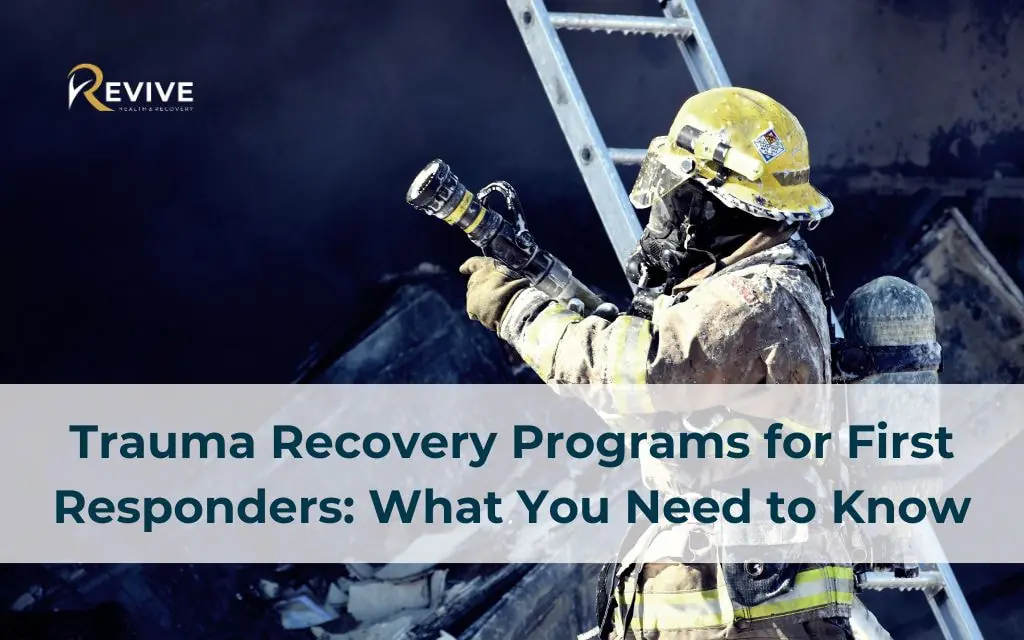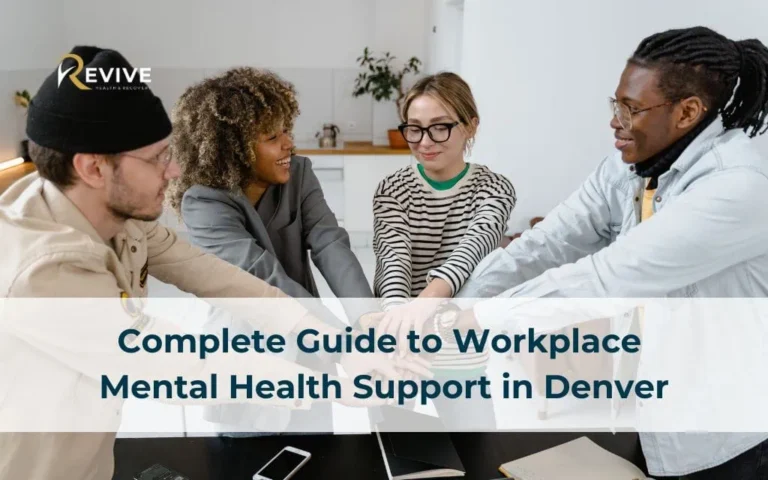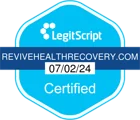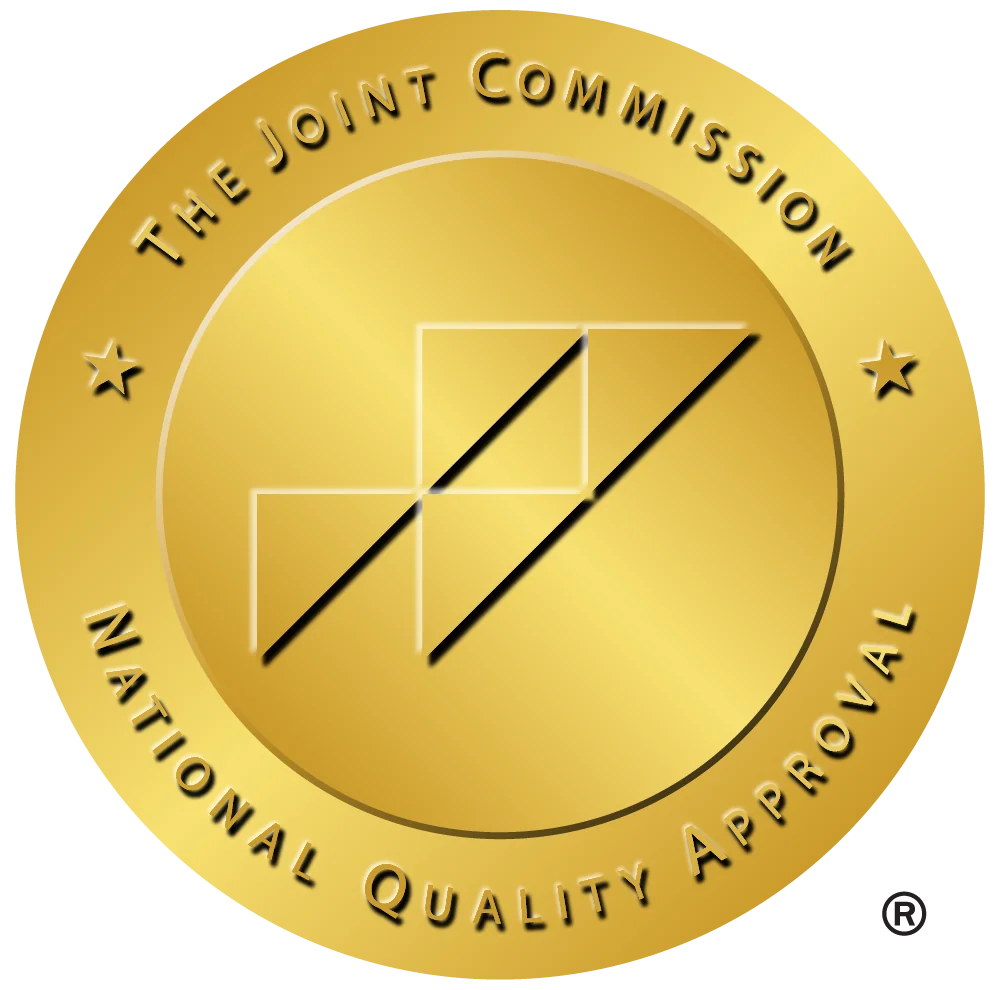First responders face relentless exposure to trauma – accidents, violence, and disasters – often without adequate support to heal from the psychological toll. At Revive Health Recovery, we specialize in trauma recovery programs for first responders, addressing their unique mental health challenges.
Unlike conventional therapy, our approach integrates evidence-based treatments with Emotional Wound Care, ensuring a comprehensive path to healing. Through personalized care, peer support, and proven trauma therapies, we empower first responders to process their experiences, regain resilience, and restore well-being. If you’re seeking effective recovery solutions tailored for those on the front lines, we’re here to help.
What Are Trauma Recovery Programs for First Responders
Trauma recovery programs provide structured mental health support and PTSD treatment designed specifically for police officers, firefighters, EMTs, and paramedics. These programs incorporate evidence-based therapies with first responder cultural competency to address trauma effectively.
Unlike standard treatment approaches, first responder programs acknowledge the distinct operational stressors and cultural factors influencing recovery. Properly structured programs help participants process traumatic events, develop coping mechanisms, and restore psychological equilibrium without stigma.
The International Association of Fire Fighters reports that comprehensive trauma recovery reduces PTSD symptoms by up to 60% among program participants who complete treatment.
Reason Why First Responders Need Specialized Trauma Care
First responders experience chronic exposure to life-threatening situations and human suffering. This continuous exposure creates a unique psychological burden different from civilian trauma experiences.
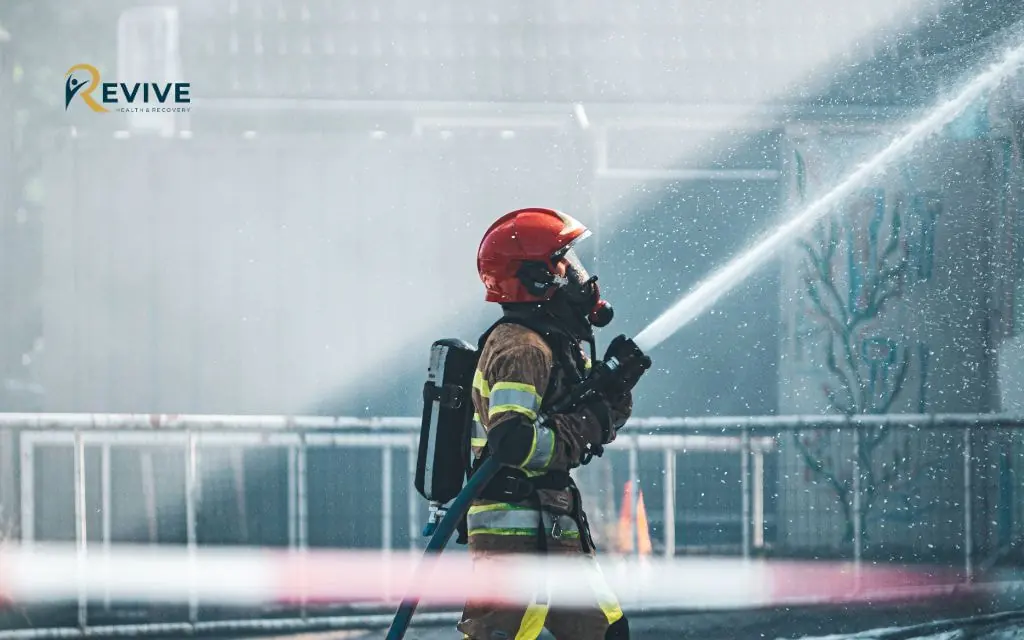
Research indicates first responders face PTSD rates five times higher than the general population. Without appropriate mental health support for first responders, this trauma manifests as:
- Operational stress injuries
- Heightened suicide risk
- Substance use disorders
- Family relationship deterioration
- Professional performance issues
Specialized trauma care addresses these issues through protocols developed specifically for emergency service professionals, incorporating peer support and cultural understanding essential for effective treatment.
Types of Trauma Recovery Programs Available in Denver
Inpatient vs. Outpatient Trauma Treatment
Trauma recovery programs in Denver offer different levels of care based on severity and individual needs.
Inpatient Programs provide intensive, residential treatment for severe PTSD symptoms or when safety concerns exist. These programs offer round-the-clock support, structured daily schedules, and removal from triggers. First responders experiencing suicidal ideation, severe depression, or substance use alongside trauma typically benefit most from inpatient care.
Outpatient Programs enable first responders to maintain work responsibilities while attending regular therapy sessions. These programs range from intensive (3-5 days weekly) to standard (1-2 sessions weekly) and work best for those with supportive home environments and moderate symptoms.
PTSD Treatment for First Responders
Evidence-based therapies form the foundation of effective trauma recovery:
Eye Movement Desensitization and Reprocessing (EMDR) helps first responders process traumatic memories through bilateral stimulation, reducing emotional distress associated with specific incidents.
Cognitive Behavioral Therapy (CBT) addresses negative thought patterns related to traumatic experiences, helping participants develop healthier perspectives.
Prolonged Exposure Therapy gradually confronts trauma-related fears in a controlled environment, reducing avoidance behaviors common in PTSD.
Resilience Training builds psychological tools to manage future stressors effectively. The First Responders Foundation endorses these approaches, noting their effectiveness in reducing trauma symptoms.
Peer Support & Group Therapy Options
Peer support creates unique healing opportunities through shared experience. Programs endorsed by the National Volunteer Fire Council pair participants with peers who understand first responder culture and challenges.
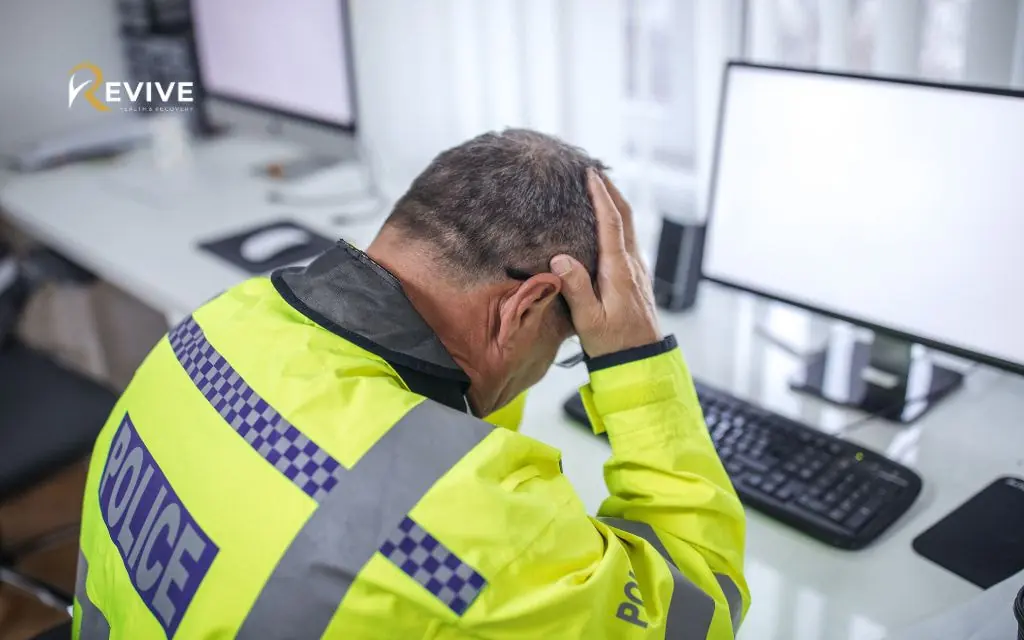
Group therapy provides validation and connection with others experiencing similar struggles. This approach reduces isolation and normalizes trauma responses within a supportive community of fellow first responders.
Benefits of Trauma Recovery Programs for First Responders
Specialized trauma recovery programs deliver significant benefits including:
- Symptom Reduction: Programs reduce flashbacks, nightmares, hypervigilance, and emotional numbing.
- Performance Improvement: First responders report enhanced decision-making, focus, and operational effectiveness after treatment.
- Resilience Development: Participants develop stress management skills, emotional regulation techniques, and improved coping mechanisms.
- Relationship Enhancement: Treatment improves family dynamics and social connections often strained by trauma.
- Career Preservation: Proper trauma care helps first responders maintain their careers and sense of purpose.
One Denver firefighter shared in Trauma Recovery Programs for First Responders: “The trauma recovery program at Revive Health Recovery helped me understand my reactions weren’t weakness but normal responses to abnormal situations. The specialized care for first responders made all the difference—they spoke our language and understood our culture.”
Finding the Best Trauma Recovery Program in Denver
How to Find the Right Program for You
When searching to find trauma recovery program for first responders in Denver, consider these essential factors:
- Specialization: Verify the program specifically addresses first responder trauma rather than offering general trauma treatment.
- Staff Credentials: Look for providers with experience treating first responders and understanding emergency service culture.
- Treatment Approaches: Ensure the program offers evidence-based therapies proven effective for PTSD in first responders.
- Peer Component: Programs incorporating peer support show higher completion rates and better outcomes.
- Confidentiality Protocols: Strong privacy protections encourage honest participation without career concerns.
- Follow-up Care: Comprehensive programs include continuing care after formal treatment ends.
Why Choose Revive Health Recovery?
Revive Health Recovery offers specialized trauma treatment designed specifically for first responders, with programs incorporating:
- First Responder Cultural Competency: Our clinical team includes professionals with emergency services backgrounds who understand the realities of first responder life.
- Comprehensive Assessment: Treatment begins with thorough evaluation addressing physical, psychological, and occupational factors affecting recovery.
- Customized Treatment Plans: No two first responders experience trauma identically – our approach tailors treatment to individual needs.
- Family Integration: We involve family members in the recovery process when appropriate, strengthening support systems essential for lasting recovery.
- Agency Coordination: Our team works with departments to facilitate treatment while protecting privacy and career considerations.
Reviews of trauma recovery programs for first responders consistently highlight our specialized approach and understanding of first responder experiences as key differentiators.
How to Enroll Trauma Recovery Programs for First Responders
How to Enroll in a First Responder Trauma Recovery Program
The enrollment process includes several straightforward steps:
- Initial Contact: Call our confidential helpline or complete the secure online form.
- Preliminary Assessment: A trained intake specialist conducts a brief assessment to understand your needs.
- Clinical Evaluation: A detailed evaluation with a clinician experienced in first responder trauma establishes treatment recommendations.
- Program Selection: Based on assessment results, we recommend appropriate level of care.
- Admission Planning: We coordinate start dates, insurance verification, and any work accommodations needed.
Eligibility typically requires active or former first responder status, though programs may extend to dispatchers and other emergency services personnel.
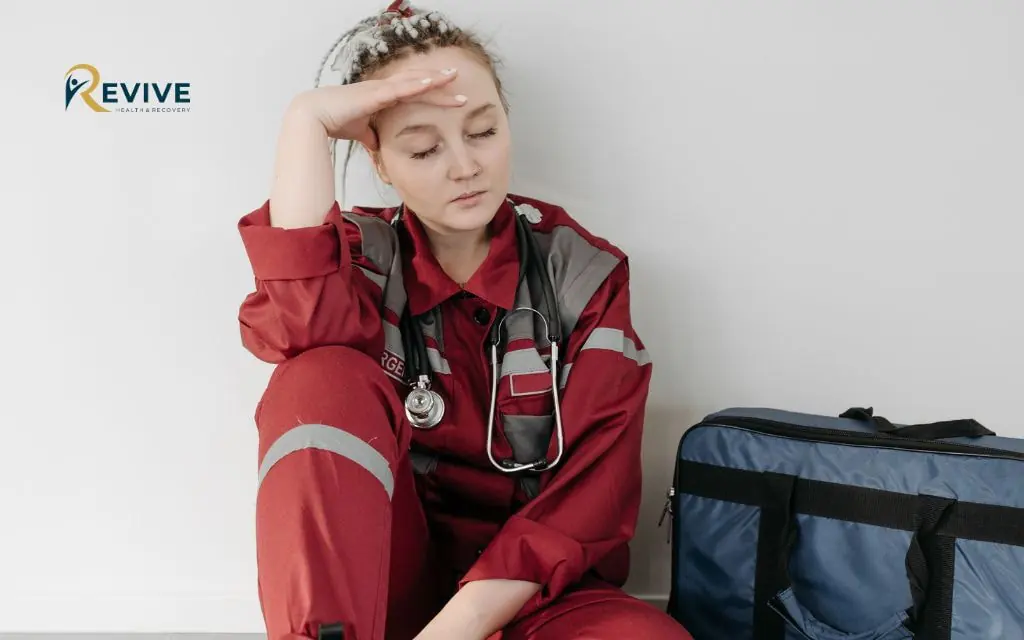
Cost of Trauma Recovery Program for First Responders in Denver
Treatment costs vary based on program intensity and duration:
- Insurance Coverage: Most major insurance plans cover trauma treatment with varying out-of-pocket costs. Revive Health Recovery works with numerous providers, including specialized first responder healthcare plans.
- Department Assistance: Many agencies offer employee assistance programs covering treatment costs or providing paid leave during recovery.
- Grant Funding: Organizations like the First Responders Foundation provide financial assistance for trauma treatment.
- Sliding Scale Options: Income-based fee adjustments make treatment accessible regardless of financial situation.
The cost of trauma recovery program for first responders in Denver typically ranges from $3,000-$8,000 for outpatient programs and $20,000-$45,000 for comprehensive inpatient treatment, though insurance significantly reduces these amounts.
Frequently Asked Questions (FAQs)
What types of trauma recovery programs are available for first responders?
Programs range from intensive inpatient treatment to flexible outpatient options, including EMDR, cognitive processing therapy, resilience training, and peer support groups.
How effective are PTSD treatments for first responders?
Research shows 70-80% of first responders experience significant symptom reduction through specialized trauma treatment. How do trauma recovery programs help first responders? They provide tools to process traumatic memories, regulate emotions, improve sleep, reduce hypervigilance, and restore healthy functioning.
Are there free or low-cost trauma recovery options in Denver?
Yes, organizations like the National Volunteer Fire Council offer grant-funded services, and most insurance plans cover treatment with minimal copays.
How long does a trauma recovery program typically last?
Programs typically range from 4-12 weeks depending on trauma severity and treatment response. Follow-up care continues for 6-12 months after primary treatment.
Does Revive Health Recovery specialize in first responder mental health?
Yes, our programs specifically address the unique trauma experiences and cultural considerations of emergency service professionals.
What support is available after completing a trauma recovery program?
Ongoing care includes booster sessions, peer support groups, wellness coaching, and integration with department resources to sustain recovery.
Conclusion
First responders dedicate their lives to protecting communities – yet often neglect their own psychological wellbeing. PTSD in first responders is an occupational hazard that requires specialized and culturally appropriate treatment.
Trauma recovery doesn’t indicate weakness but acknowledges the real psychological impact of repeated exposure to life’s most challenging moments especially in Coping with PTSD. How to enroll in trauma recovery program for first responders begins with a single confidential call to Revive Health Recovery at (303) 268-4655.
Our Denver-based programs provide the specialized Trauma Recovery Programs for First Responders. Contact us today to begin your journey toward psychological resilience and renewed purpose in your vital community role.
